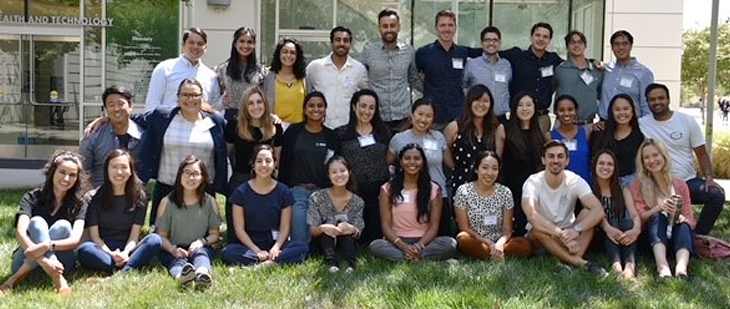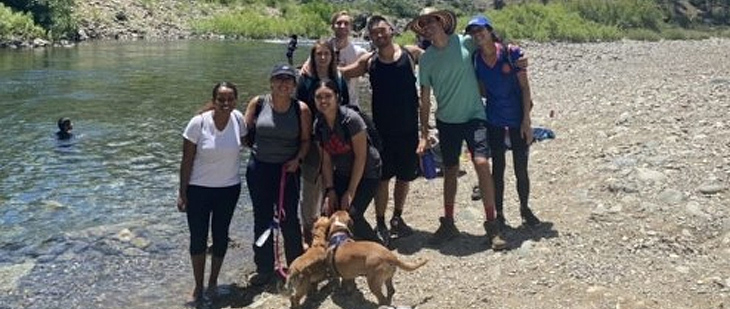Internal Medicine Residency
Categorical Program

Block Scheduling
We use a block scheduling model (also known as “X+Y”) to minimize competing demands between inpatient and outpatient responsibilities. Interns follow a 4+2 schedule, and upper-level residents follow a 4+4 schedule. Most rotations are two weeks in length, though residents may opt for four-week electives to gain added exposure. Vacations are scheduled during ambulatory blocks, in either one- or two-week increments. During inpatient blocks, residents do not attend their continuity clinic, allowing them to focus fully on the inpatient experience. Ambulatory blocks include weekly academic half-days, which are protected educational sessions.
Inpatient Rotations
Over the duration of their residency, all residents will participate in the following inpatient rotations:
- UC Davis Cardiology Inpatient service
- UC Davis Wards
- UC Davis Hematology/Oncology service
- UC Davis MICU
- UC Davis General Medicine Consults service
- UC Davis Neurology Inpatient service
- UC Davis Emergency Medicine
- UC Davis Night Float
- Kaiser North Wards and ICU
- VA Wards
- VA ICU
- VA Geriatrics
Learn more about different rotations
Ambulatory Rotations
The ambulatory training of our Categorical Residents is also very strong. Residents have 8 to 10 weeks of ambulatory training each year. During these rotations, they will have a combination of continuity clinic and subspecialty clinics.
We utilize clinics at all of our ambulatory clinical sites:
- UC Davis Health sites
- VA Mather
- Kaiser clinics in Sacramento and Roseville
- Sacramento County clinic (a Federally Qualified Health Center)
- One Community Health HIV clinic (a Federally Qualified Health Center)
- Mercy and Dignity Health System clinics
Our residents have access to a very comprehensive collection of subspecialty clinics. If residents have a particular interest in certain fields, we are able to incorporate more of a certain type of clinic into their outpatient rotations. Our goal as a residency program is to help residents tailor their education to their interests.
We have required rotations in Addiction Medicine (R3) and Outpatient Geriatrics (R2). In addition, residents can rotate through these clinics:
- Allergy
- Cardiology (CHF, EP, Women's CV, General)
- Dermatology
- Endocrinology
- Gastroenterology
- Gender Affirming Care
- Geriatrics
- Hematology
- Hepatology
- Infectious Disease
- Loaves and Fishes Clinic (persons experiencing homelessness)
- Nephrology
- Neurology
- Oncology
- Pain Medicine
- Palliative Care
- Physical Medicine and Rehabilitation
- Podiatry
- Psychiatry
- Pulmonary (ILD, Asthma, COPD, Cystic Fibrosis)
- Rheumatology
- Sleep
- Sports Medicine
- Travel
- Urology
- Vascular
- Women's Health
Electives
All of our interns and residents will rotate through electives. These are what we currently offer:
- Antibiotic Stewardship
- Cardiology (inpatient and outpatient electives available; consult service, heart failure service)
- Endocrinology (inpatient and outpatient electives available)
- Gastroenterology and Hepatology (inpatient and outpatient electives available)
- Hematology and Oncology (inpatient and outpatient electives available)
- Infectious Diseases (a combined inpatient/outpatient elective)
- Master Clinician Educator
- MICU R2 elective
- Nephrology (inpatient and outpatient electives available)
- Palliative Care
- Physical Medicine and Rehabilitation
- Pulmonology (inpatient and outpatient electives available)
- Rheumatology (a combined inpatient/outpatient elective)
- Hospitalists (Screening Hospitalist and Independent Practice Hospitalist rotations)
- TB Clinic
- Toxicology
Motivated residents can also create an elective suited to their personal interests. Electives that past residents have successfully created and completed include:
- Pain Medicine
- Transplant Infectious Disease
- POCUS
- Anesthesiology

Elective Tracks
Interested interns and residents are able to apply for different programs and tracks. The Research Track starts in the intern year. The remaining tracks are in the PGY2 and PGY3 years and residents “apply” during their intern year:
